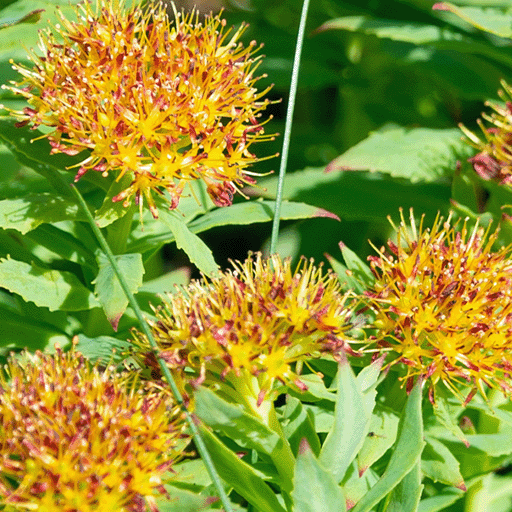
RHODIOLA ROSEA
Rhodiola Rosea is a natural adaptogen that supports mental & physical endurance by reducing cortisol levels and the perceived exertion of demanding tasks. This helps maintain focus and resilience, making it beneficial for sustained, high-intensity work.
RHODIOLA ROSEA
Rhodiola Rosea is an herb that grows in the colder high altitude regions of the world including Europe, Asia, and even the Arctic. Due to it’s rich history it’s known as many other names such as Golden Root, Arctic Root, and Rosenroot. It’s thought to have been used as far back as the Vikings to improve strength for hard work [13]. It’s primary purpose is to reduce fatigue and better handle physical or mental stress, though it’s been used for many benefits. For example, it’s known to help you concentrate for longer, improve your mood, prevent burnout, and help hard work feel easier.
People also supplement with Rhodiola Rosea to improve exercise performance. In one study, untrained individuals that combined Rhodiola Rosea & caffeine achieved a +16.59% increase in their bench press one-rep max, a +15.75% increase to their deep squat one-rep max, and a +22.15% increase in the max number of bench press reps they could perform from lifting 60% of their one-rep max weight [12]. Trained individuals, despite having a much better baseline performance, still saw improvements [12].
How?
Rhodiola Rosea’s ability to reduce fatigue comes from it’s effect of reducing the perceived exertion or perceived effort on physically or mentally challenging tasks. Cyclists and runners take Rhodiola Rosea to go longer and faster [7, 8]. Dr. Andrew Huberman supplements with Rhodiola Rosea before a high intensity workout to make the hard work feel easier and not feel exhausted for the rest of the day [2]. Others use it to help mental work feel easier & less draining, allowing them to stay productive for longer. Like when you're studying, working on a challenging job, or building your next business.
People also experience improvements in mood since Rhodiola Rosea prevents increases to cortisol, your body’s “stress hormone” [1]. Higher levels of burnout are associated with increased levels of cortisol [5]. People with burnout who supplemented with Rhodiola Rosea for 28 days had lower levels of cortisol, improved mental performance, and were better at concentrating [3]. Even healthy individuals experience an improved overall well-being [4]. Thus modulating cortisol to be lower is thought to be the mechanism for reducing burnout, lifting mood, and improving concentration under stressful conditions.
Dosage
Rhodiola Rosea has a bell-curve response, meaning that overly exceeding the recommended doses is ineffective to experience the benefits. The suggested daily dose is 200-600 mg daily, but some experience benefits using as low as 50 mg depending on the effect they’re looking for.
As with all ingredients, ANOO aims to provide the optimal effective dosage based on the latest research. At the same time we also don’t unnecessarily increase dosages since that can increase the chance of side effects. Fewer premium ingredients dosed at their most researched amounts is not only a lot safer, but also more likely to give you your intended result.
Rhodiola Rosea works right away, but its benefits grow with long-term consistent use. [9, 14].
Benefits
- Reduce fatigue [3, 6, 9, 11]
- Improve physical endurance [4, 7, 8, 11]
- Reduce perceived exertion [7, 8, 11]
- Improve cognitive performance under stress [1, 3, 10]
- Antidepressant [1, 3, 9, 14]
- Increase in strength & power [11, 12]
- Concentrate for longer [3]
- Prevent/reduce burnout [3]
- Reduce increases in cortisol [1, 3]
References
[1] https://pubmed.ncbi.nlm.nih.gov/21901061/
[2] https://podclips.com/c/VHMrxV
[3] https://pubmed.ncbi.nlm.nih.gov/19016404/
[4] https://pubmed.ncbi.nlm.nih.gov/10839209/
[5] https://pubmed.ncbi.nlm.nih.gov/16186006/
[6] https://pubmed.ncbi.nlm.nih.gov/11081987/
[7] https://pubmed.ncbi.nlm.nih.gov/23443221/
[8] https://pubmed.ncbi.nlm.nih.gov/26464892/
[9] https://pubmed.ncbi.nlm.nih.gov/28219059/
[10] https://pubmed.ncbi.nlm.nih.gov/19500070/
[11] https://pubmed.ncbi.nlm.nih.gov/35464040/
[12] https://pubmed.ncbi.nlm.nih.gov/36771289/
[13] https://pubmed.ncbi.nlm.nih.gov/20378318/
[14] https://pubmed.ncbi.nlm.nih.gov/17990195/
